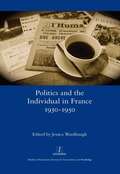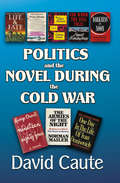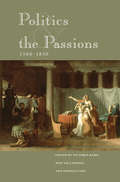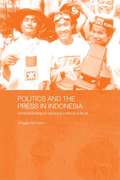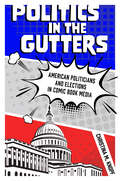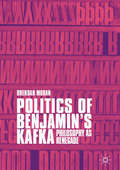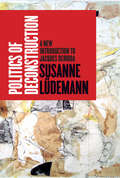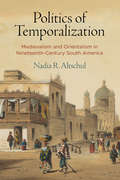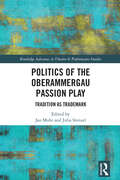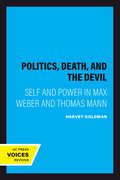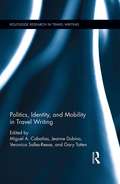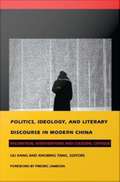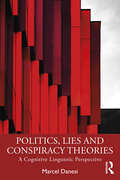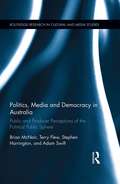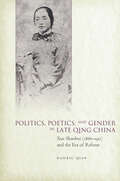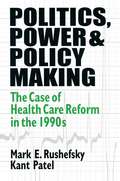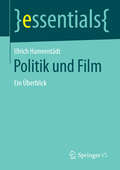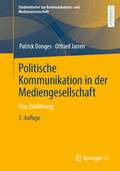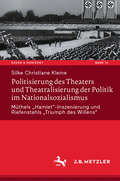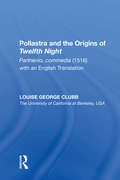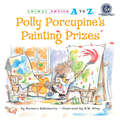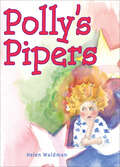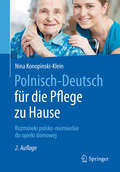- Table View
- List View
Politics and the Individual in France 1930-1950
by Jessica WardhaughThe crises and conflicts of mid-century Europe highlight the fragility of individual life and commitment. Yet this was a time at which individuals engaged in politics on an unprecedented scale, whether in movements, parties and street politics, through culture, or by the choices confronted in war and occupation. Focusing on France, and bringing together historians of politics, literature, philosophy, art, and film, this volume sheds new light on the imagination and experience of the political individual in the age of the masses. From a controversial art exhibition on Algeria to the private diary of a Jewish lawyer in Occupied Paris, these case studies illuminate the specificities of French ideas and experiences in mid-century Europe. They also contribute to a deeper understanding of memory, agency, and responsibility in times of crisis.
Politics and the Novel During the Cold War
by David CauteDavid Cautes wide-ranging study examines how outstanding novelists of the Cold War era conveyed the major issues of contemporary politics and history. In the United States and Western Europe the political novel flourished in the 1930s and 1940s, the crisis years of economic depression, fascism, the Spanish Civil War,the consolidation of Stalinism, and the Second World War. Starting with the high hopes generated by the Spanish Civil War, Caute then explores the god that failed pessimism that overtook the Western political novel in the 1940s. The writers under scrutiny include Hemingway, Dos Passos, Orwell, Koestler, Malraux, Serge, Greene, de Beauvoir, and Sartre. Strikingly different approaches to the burning issues of the time are found among orthodox Soviet novelists such as Sholokhov, Fadeyev, Kochetov, and Pavlenko. Soviet official culture continued to choke on modernism, formalism, satire, and allegory. In Russia and Eastern Europe dissident novelists offered contesting voices as they engaged in the fraught re-telling of life under Stalinism. The emergence of the New Left in the 1960s generated a new wave of fiction challenging Americas global stance. Mailer, Doctorow, and Coover brought fresh literary sensibilities tobear on such iconic events as the 1967 siege of the Pentagon and the execution of the Rosenbergs.
Politics and the Passions, 1500-1850
by Victoria Kahn ; Neil Saccamano & Daniela ColiFocusing on the new theories of human motivation that emerged during the transition from feudalism to the modern period, this is the first book of new essays on the relationship between politics and the passions from Machiavelli to Bentham. Contributors address the crisis of moral and philosophical discourse in the early modern period; the necessity of inventing a new way of describing the relation between reflection and action, and private and public selves; the disciplinary regulation of the body; and the ideological constitution of identity. The collection as a whole asks whether a discourse of the passions might provide a critical perspective on the politics of subjectivity. Whatever their specific approach to the question of ideology, all the essays reconsider the legacy of the passions in modern political theory and the importance of the history of politics and the passions for modern political debates. Contributors, in addition to the editors, are Nancy Armstrong, Judith Butler, Riccardo Caporali, Howard Caygill, Patrick Coleman, Frances Ferguson, John Guillory, Timothy Hampton, John P. McCormick, and Leonard Tennenhouse.
Politics and the Press in Indonesia: Understanding an Evolving Political Culture
by Angela RomanoThis book explores the evolving political culture in Indonesia, by discussing the country's dominant political philosophies, then showing how those philosophies affect the working lives of ordinary Indonesian citizens. It focuses in particular on the working lives of news journalists, a group that occupies a strategic social and political position.
Politics in the Gutters: American Politicians and Elections in Comic Book Media
by Christina M. KnopfFrom the moment Captain America punched Hitler in the jaw, comic books have always been political, and whether it is Marvel’s chairman Ike Perlmutter making a campaign contribution to Donald Trump in 2016 or Marvel’s character Howard the Duck running for president during America’s bicentennial in 1976, the politics of comics have overlapped with the politics of campaigns and governance. Pop culture opens avenues for people to declare their participation in a collective project and helps them to shape their understandings of civic responsibility, leadership, communal history, and present concerns.Politics in the Gutters: American Politicians and Elections in Comic Book Media opens with an examination of campaign comic books used by the likes of Herbert Hoover and Harry S. Truman, follows the rise of political counterculture comix of the 1960s, and continues on to the graphic novel version of the 9/11 Report and the cottage industry of Sarah Palin comics. It ends with a consideration of comparisons to Donald Trump as a supervillain and a look at comics connections to the pandemic and protests that marked the 2020 election year. More than just escapist entertainment, comics offer a popular yet complicated vision of the American political tableau. Politics in the Gutters considers the political myths, moments, and mimeses, in comic books—from nonfiction to science fiction, superhero to supernatural, serious to satirical, golden age to present day—to consider how they represent, re-present, underpin, and/or undermine ideas and ideals about American electoral politics.
Politics of Benjamin’s Kafka: Philosophy As Renegade
by Brendan MoranThis book provides a critical assessment of Benjamin’s writings on Franz Kafka and of Benjamin’s related writings. Eliciting from Benjamin’s writings a conception of philosophy that is political in its dissociation from – its becoming renegade in relation to, its philosophic shame about – established laws, norms, and forms, the book compares Benjamin’s writings with relevant works by Agamben, Heidegger, Levinas, and others. In relating Benjamin’s writings on Kafka to Benjamin’s writings on politics, the study delineates a philosophic impetus in literature and argues that this impetus has potential political consequences. Finally, the book is critical of Benjamin’s messianism insofar as it is oriented by the anticipated elimination of exceptions and distractions. Exceptions and distractions are, the book argues, precisely what literature, like other arts, brings to the fore. Hence the philosophic, and the political, importance of literature.
Politics of Deconstruction: A New Introduction to Jacques Derrida
by Susanne Lüdemann translated by Erik ButlerThe book offers a new introduction to Jacques Derrida and to Deconstruction as an important strand of Continental Philosophy. From his early writings on phenomenology and linguistics to his later meditations on war, terrorism, and justice, Jacques Derrida (1930–2004) achieved prominence on an international scale by addressing as many different audiences as he did topics. Yet despite widespread acclamation, his work has never been considered easy. Rendering accessible debates that marked more than four decades of engagement and inquiry, Susanne Lüdemann traces connections between the philosopher's own texts and those of his many interlocutors, past and present. Unlike conventional introductions, Politics of Deconstruction offers a number of personal approaches to reading Derrida and invites readers to find their own. Emphasizing the relationship between philosophy and politics, it shows that, with Deconstruction, there is much more at stake than an "academic" discussion, for Derrida's work deals with all the burning political and intellectual challenges of our time. The author's own professional experience in both the United States and in Europe, which particularly inform her chapter on Derrida's reception in the United States, opens a unique perspective on a unique thinker, one that rewards specialists and newcomers alike.
Politics of Temporalization: Medievalism and Orientalism in Nineteenth-Century South America
by Nadia R. AltschulA postcolonial study of the conceptualization of nineteenth- and twentieth-century Latin America as medieval and orientalIf Spain and Portugal were perceived as backward in the nineteenth century—still tainted, in the minds of European writers and thinkers, by more than a whiff of the medieval and Moorish—Ibero-America lagged even further behind. Originally colonized in the late fifteenth century, Chile, Argentina, and Brazil were characterized by European travelers and South American elites alike as both feudal and oriental, as if they retained an oriental-Moorish character due to the centuries-long presence of Islam in the Iberian Peninsula. So, Nadia R. Altschul observes, the Scottish metropolitan writer Maria Graham (1785-1842) depicted the Chile in which she found herself stranded after the death of her sea captain husband as a premodern, precapitalist, and orientalized place that could only benefit from the free trade imperialism of the British. Domingo F. Sarmiento (1811-1888), the most influential Latin American writer and statesman of his day, conceived of his own Euro-American creole class as medieval in such works as Civilization and Barbarism: The Life of Juan Facundo Quiroga (1845) and Recollections of a Provincial Past (1850), and wrote of the inherited Moorish character of Spanish America in his 1883 Conflict and Harmony of the Races in America. Moving forward into the first half of the twentieth century, Altschul explores the oriental character that Gilberto Freyre assigned to Portuguese colonization in his The Masters and the Slaves (1933), in which he postulated the "Mozarabic" essence of Brazil.In Politics of Temporalization, Altschul examines the case of South America to ask more broadly what is at stake—what is harmed, what is excused—when the present is temporalized, when elements of "the now" are characterized as belonging to, and consequently imposed upon, a constructed and othered "past."
Politics of the Oberammergau Passion Play: Tradition as Trademark (Routledge Advances in Theatre & Performance Studies)
by Jan Mohr Julia StenzelThis collection provides a comprehensive overview of the Oberammergau Passion play and its history from the 19th century onwards. Specialists in theatre and performance studies, comparative literature, theology, political studies, history, and ethnology initiate an interdisciplinary discussion of how Oberammergau has built a trademark from tradition. A typological and historical outline of this development is followed by detailed analyses of the blending of spaces, temporalities, and cultures, through which Oberammergau as an institution is stabilized while at the same time remaining open to the dynamics of historical change. The authors comprise the formation of a theatrical public sphere, literary imaginations, and layers of authenticity in modern practices of distributed communication that culminate in the notion of tradition as trademark. This collection is analysed from a wide spectrum of cultural historical perspectives, ranging from literary studies, theatre and performance studies to theology, political studies, and ethnology.
Politics, Death, and the Devil: Self and Power in Max Weber and Thomas Mann
by Harvey GoldmanThis sequel to Harvey Goldman's well-received Max Weber and Thomas Mann continues his rich exploration of the political and cultural critiques embodied in the more mature writings of these two authors. Combining social and political thought, intellectual history, and literary interpretation, Goldman examines in particular Weber's "Science as a Vocation" and "Politics as a Vocation" and Mann's The Magic Mountain and Doctor Faustus.Goldman deals with the ways in which Weber and Mann sought an antidote to personal and cultural weakness through "practices" for generating strength, mastery, and power, drawing primarily on ascetic traditions at a time when the vitality of other German traditions was disappearing. Power and mastery concerned both Weber and Mann, especially as they tried to resolve problems of politics and culture in Germany. Although their resolutions of the problems they confronted seem inadequate, they show the significance of linking social and political thought to conceptions of self and active worldly practices.Trenchant and illuminating, Goldman's book is essential reading for anyone interested in political theory, social thought, and the intellectual history of Germany.
Politics, Identity, and Mobility in Travel Writing (Routledge Research in Travel Writing)
by Jeanne Dubino Miguel A. Cabañas Veronica Salles-Reese Gary TottenThis collection examines the intersections between the personal and the political in travel writing, and the dialectic between mobility and stasis, through an analysis of specific cases across geographical and historical boundaries. The authors explore the various ways in which travel texts represent actual political conditions and thus engage in discussions about national, transnational, and global citizenship; how they propose real-world political interventions in the places where the traveler goes; what tone they take toward political or socio-political violence; and how they intersect with political debates. Travel writing can be viewed as political in a purely instrumental sense, but, as this volume also demonstrates, travel writing’s reception and ideological interventions also transform personal and cultural realities. This book thus examines the ways in which politics’ material effects inform and intersect with personal experience in travel texts and engage with travel’s dialectic of mobility and stasis. In spite of globalization and efforts to eradicate the colonial vision in travel writing and in travel writing criticism, this vision persists in various and complex ways. While the travelogue can be a space of discursive and direct oppression, these essays suggest that the travelogue is also a narrative space in which the traveler employs the genre to assert authority over his or her experiences of mobility. This book will be an important contribution for interdisciplinary scholars with interests in travel writing studies, global and transnational studies, women’s studies, multicultural studies, the social sciences, and history.
Politics, Ideology and Literary Discourse in Modern China
by Liu Kang Xiaobing TangThis collection of essays addresses the perception that our understanding of modern China will be enhanced by opening the literature of China to more rigorous theoretical and comparative study. In doing so, the book confronts the problematic and complex subject of China's literary, theoretical, and cultural responses to the experience of the modern. With chapters by writers, scholars, and critics from mainland China, Hong Kong, and the United States, this volume explores the complexity of representing modernity within the Chinese context. Addressing the problem of finding a proper language for articulating fundamental issues in the historical experience of twentieth-century China, the authors critically re-examine notions of realism, the self/subject, and modernity and draw on perspectives from feminist criticism, ideological analysis, and postmodern theory. Among the many topics explored are subjectivity in Chinese cultural theory, Chinese gender relations, the viability of a Lacanian approach to Chinese identity, the politics of subversion in Chinese reportage, and the ambivalent status of the icon of paternity since Mao. At the same time this book offers a probing look into the transformation that Chinese culture as well as the study of that culture is currently undergoing, it also reconfirms private discourse as an ideal site for an investigation into a real and imaginary, private and collective encounter with history. Contributors. Liu Kang, Xiaobing Tang, Liu Zaifu, Stephen Chan, Lydia H. Liu, Wendy Larson, Theodore Huters, David Wang, Tonglin Lu, Yingjin Zhang, Yuejin Wang, Li Tuo, Leo Ou-fan Lee
Politics, Lies and Conspiracy Theories: A Cognitive Linguistic Perspective
by Marcel DanesiPolitics, Lies and Conspiracy Theories: A Cognitive Linguistic Perspective shows how language influences mechanisms of cognition, perception, and belief, and by extension its power to manipulate thoughts and beliefs. This exciting and original work is the first to apply cognitive linguistics to the analysis of political lies and conspiracy theories, both of which have flourished in the internet age and which many argue are threatening democracy. It unravels the verbal mechanisms that make these "different truths" so effective and proliferative, dissecting the verbal structures (metaphor, irony, connotative implications, etc.) of a variety of real-life cases concerning politicians, conspiracy theorists, and influencers. Marcel Danesi goes on to demonstrate how these linguistic structures "switch on" or "switch off" alternative mind worlds. This book is essential reading for students of cognitive linguistics and will enrich the studies of any student or researcher in language and linguistics more broadly, as well as discourse analysis, rhetoric, or political science.
Politics, Media and Democracy in Australia: Public and Producer Perceptions of the Political Public Sphere (Routledge Research in Cultural and Media Studies)
by Terry Flew Adam Swift Stephen Harrington Brian McNairIn Australia, as in many comparable democracies, the role of the media in the political process is high on the public agenda. There is a perception of widespread disillusionment with and disengagement from politics amongst voters, and criticism of the media for failing to fulfil their democratic responsibilities adequately. This book evaluates public perceptions of the performance of the political media in the context of the declared aims and objectives of media producers. From there the authors present findings for improving the capacity of political media to engage and inform their audiences in ways which enhance the quality and popular legitimacy of the democratic process. These conclusions are of import not only to Australians, but to observers of mediated politics in the UK, the US and other countries where similar debates around the ‘crisis of public communication’ are on-going.
Politics, Poetics, and Gender in Late Qing China: Xue Shaohui and the Era of Reform
by Nanxiu QianIn 1898, Qing dynasty emperor Guangxu ordered a series of reforms to correct the political, economic, cultural, and educational weaknesses exposed by China's defeat by Japan in the First Sino-Japanese War. The "Hundred Day's Reform" has received a great deal of attention from historians who have focused on the well-known male historical actors, but until now the Qing women reformers have received almost no consideration. In this book, historian Nanxiu Qian reveals the contributions of the active, optimistic, and self-sufficient women reformers of the late Qing Dynasty. Qian examines the late Qing reforms from the perspective of Xue Shaohui, a leading woman writer who openly argued against male reformers' approach that subordinated women's issues to larger national concerns, instead prioritizing women's self-improvement over national empowerment. Drawing upon intellectual and spiritual resources from the freewheeling, xianyuan (worthy ladies) model of the Wei-Jin period of Chinese history (220-420) and the culture of women writers of late imperial China, and open to Western ideas and knowledge, Xue and the reform-minded members of her social and intellectual networks went beyond the inherited Confucian pattern in their quest for an ideal womanhood and an ideal social order. Demanding equal political and educational rights with men, women reformers challenged leading male reformers' purpose of achieving national "wealth and power," intending instead to unite women of all nations in an effort to create a just and harmonious new world.
Politics, Power and Policy Making: Case of Health Care Reform in the 1990s
by Mark E Rushefsky Kant PatelTracking the issues of healthcare reform through the tumultous 1990s, this work opens a window on the changing dynamics of American politics from the Clinton inauguration in January 1993 through the Republican revolution of 1995 and the 1996 presidential race.
Politics, Religion, and Culture in an Anxious Age
by John BuellAmerican politics is increasingly driven by apocalyptic rhetoric. Highlighting possible adverse consequences of such politics for our freedom and quality of life, the book suggests alternative policy agendas, religious and philosophical discourses, cultural framing and modes of daily living
Politik und Film: Ein Überblick (essentials)
by Ulrich HamenstädtDieses Essential bietet einen Überblick zu unterschiedlichen Interpretationen der Verbindung zwischen Politik und Film. Filme und Fernsehserien werden dabei als wichtige Darstellungsformen von Politik begriffen. In zahlreichen Formaten wird dies in den letzten Jahren deutlich. Interessant wird es jedoch, wenn Filme und Serien nicht den Anspruch erheben politisch zu sein, dies jedoch implizit sind. Denn Filme spielen zum einen immer mit Vorannahmen des Publikums, produzieren andererseits aber auch spezifische politische Annahmen und Weltanschauungen bei ihrem Publikum. So sind beispielsweise Ängste oder gesellschaftlich verbreitete Feindbilder für die Wirkung von Filmen bedeutungsvoll. James Bond bekommt heute keine Liebesgrüße mehr aus Moskau, dafür rücken Cyberangriffe und die zunehmende Macht Chinas in den Mittelpunkt der Filmreihe.
Politische Kommunikation in der Mediengesellschaft: Eine Einführung (Studienbücher zur Kommunikations- und Medienwissenschaft)
by Patrick Donges Otfried JarrenPolitische Kommunikation in der Mediengesellschaft ist ein komplexer und vielschichtiger Forschungsgegenstand. Das Lehrbuch legt den Schwerpunkt auf die Strukturen, Akteure und Prozesse politischer Kommunikation und analysiert diese aus einer kommunikationswissenschaftlichen Perspektive unter Berücksichtigung der Theorie- und Forschungsbestände anderer Sozialwissenschaften. Politische Medieninhalte werden als das Ergebnis von Interaktionsprozessen verstanden, die im Rahmen von Strukturen der Politik wie der Medien zwischen politischen und medialen Akteuren stattfinden. Dabei wird der Mesoebene der Organisationen wie der Makroebene der Gesellschaft besondere Aufmerksamkeit geschenkt, da politische Kommunikation in erster Linie eine organisierte Form der Kommunikation ist – sowohl auf Seiten der Politik wie auch auf Seiten der Medien. Gegenüber der zweiten Auflage wurde das Lehrbuch grundlegend aktualisiert, gestrafft und neu strukturiert.
Politisierung des Theaters und Theatralisierung der Politik im Nationalsozialismus: Müthels „Hamlet“-Inszenierung und Riefenstahls „Triumph des Willens“ (Szene & Horizont. Theaterwissenschaftliche Studien #13)
by Silke Christiane KleineVorliegende Arbeit beschäftigt sich mit den Fragen nach der Politisierung der Bühne während des „Dritten Reiches“ und der Nutzbarmachung theatraler Operativität für die politische nationalsozialistische Massenversammlung anhand der Analysen einer massenwirksamen Hamlet-Inszenierung (Lothar Müthel, Berlin 1936) und von Leni Riefenstahls filmischer Dokumentation des „Reichsparteitags der Einheit und Stärke“ 1934 („Triumph des Willens“). Während sich das Medium der Theaterbühne als nicht sonderlich fruchtbar für propagandistische Zwecke erwiesen hatte, ereignete sich das „eigentliche“ Theater des „Dritten Reiches“ auf den Plätzen und in den Arenen des politischen Massenauftritts. Es geschah also ein Transfer theatraler Mittel und Operativität hin zu öffentlichen Massenveranstaltungen des Regimes. Theatrale, dramaturgische Elemente der Theaterbühne erwiesen sich in Kombination mit massenpsychologischen Grundmechanismen als besonders tragfähig, sodass man sagen kann, dass es sich bei NS-tendenziösen Theaterinszenierungen um Präfigurationen des politischen Massenauftritts handelte. Dies wird anhand öffentlicher Veranstaltungen im Nationalsozialismus erörtert; diese werden im Hinblick auf theatrale Kategorien wie der Ausgestaltung/Architektur des Raumes, Auditivität (Stimme und Rede, die Rolle der Lautsprechertechnologie), Licht/Beleuchtung und Requisiten analysiert. Neben diesen Aspekten der Theaterregie kamen (hier: pseudo-) religiöse Aspekte der Kirchenregie zum Tragen. Leni Riefenstahls filmische Dokumentation „Triumph des Willens“ zeigt eindrücklich die Kulmination der bis dato in vielen Auftritten erprobten massenpsychologischen Dramaturgie im Großereignis von Nürnberg. Zudem entgrenzt Riefenstahl das Ereignis durch die Reproduzierbarkeit des Mediums „Film“. Einerseits stellt der Film den Initiationsprozess für die jungen Nationalsozialisten auf dem „Reichsparteitag“ in Nürnberg dar, andererseits war die „Lektüre“ des Films gleichsam ein Initiationsprozess für den Zuschauer; das filmische Zeugnis Leni Riefenstahls konnte so die Präsenzteilnahme am „Reichsparteitag der Einheit und Stärke“ ersetzen.
Pollastra and the Origins of Twelfth Night: Parthenio, commedia (1516) with an English Translation (Anglo-Italian Renaissance Studies)
by Louise George ClubbPollastra and the Origins of Twelfth Night addresses two closely linked and increasingly studied issues: the nature of the relation of Shakespeare's plays to Italian culture, and the technology of modern theater invented in Renaissance Italy. The discovery of forgotten works by Giovanni Lappoli, known as Pollastra, led to publication in Italy in 1993 in a limited edition of the Italian texts with supplemental scholarship by the authors, entitled Romance and Aretine Humanism in Sienese Comedy. One of those texts, the comedy Parthenio, has escaped the attention of theater bibliographers, because it was quickly sold out in its time and only a handful of copies are known to exist today. Yet it played an important part in the birth of Italian Renaissance drama and of modern comedy in general, in that it was the immediate predecessor and source of Gl'Ingannati, arguably the most famous comedy of the Italian Renaissance and certainly the most imitated, translated, adapted all over Europe. The best known of its progeny is Shakespeare's Twelfth Night. Much has been written in Italy and England about Gl'Ingannati and Shakespeare's debt to it, but nothing at all about Parthenio. This volume provides the first English translation (with the original Italian on facing pages); and presents for an international audience the theatrical scholarship from the 1993 book Romance and Aretine Humanism in Sienese Comedy, augmented with new findings.
Pollution and Crisis in Greek Tragedy
by Fabian MeinelPollution is ubiquitous in Greek tragedy: matricidal Orestes seeks purification at Apollo's shrine in Delphi; carrion from Polyneices' unburied corpse fills the altars of Thebes; delirious Phaedra suffers from a 'pollution of the mind'. This book undertakes the first detailed analysis of the important role which pollution and its counterparts - purity and purification - play in tragedy. It argues that pollution is central in the negotiation of tragic crises, fulfilling a diverse array of functions by virtue of its qualities and associations, from making sense of adversity to configuring civic identity in the encounter of self and other. While primarily a literary study providing close readings of several key plays, the book also provides important new perspectives on pollution. It will appeal to a broad range of scholars and students not only in classics and literary studies, but also in the study of religions and anthropology.
Polly Porcupine's Painting Prizes (Animal Antics A to Z)
by Barbara deRubertisPolly Porcupine has a painting problem. Her paintings are sloppy and drippy and different—and Papa Porcupine does NOT appreciate the mess. Can Polly solve her problem and paint a picture for the art show at the same time?
Polly's Pipers
by Helen WaldmanIn this beautifully illustrated children’s book, a little girl learns lessons about communication as she looks for her missing pipers—but what are pipers?“Where are my pipers? Where are my pipers?” Polly asks. “What are pipers?” her mommy and daddy reply. Polly’s important pipers have gone missing. She has looked everywhere—under the bed, inside her closet, and in the kitchen. Where can they be? Mommy wants to help but isn’t sure what Polly is looking for.Join Polly on a colorful and whimsical search to find her missing pipers. A sweet and familiar story of misunderstanding, Polly’s Pipers is sure to remind readers of their own lively hunts for missing treasure—and offers a valuable lesson about communication.
Polnisch-Deutsch für die Pflege zu Hause: Rozmówki polsko-niemieckie do opieki domowej
by Nina Konopinski-KleinSprachführer für den PflegealltagDieses übersichtliche Wörterbuch ist ein unverzichtbarer Helfer im Gespräch. Begriffe und einfache Sätze aus dem Alltag werden in beiden Sprachen aufgeführt und erleichtern die Verständigung im Alltag. Einfache Dialoge zu Alltagsthemen wie z.B. Wohlbefinden, Krankheit, Arztbesuch, Haushalt, und Ernährung. Aber auch wichtige Fachbegriffe aus der Pflege werden elräutert. Zahlreiche Abbildungen unterstützen das Gespräch und hilfreiche Vokabellisten erleichtern das Lernen neuer Wörter.Empfehlenswert für polnische Pflegekräfte und Haushaltshilfen, die in Deutschland arbeiten; aber auch Senioren und Angehörige finden darin Hilfen zum Gespräch.Przewodnik językowy z zakresu codziennej opiekiTen przejrzyście napisany słownik językowy jest niezbędną pomocą w codziennej komunikacji. Przedstawione w dwóch językach proste słowa i powszechnie używane zdania ułatwiają obustronne porozumienie na codzień.Ważne określenia i zwroty dotyczące opiekiProste dialogi dotyczące dnia codziennego jak np. samopoczucie, choroba, wizyta u lekarza, gospodarstwo domowe czy żywienie.Ilustracje wspomagające rozmowyZestawienie słówek i zwrotówPolecany dla opiekunek z Polski pracujących na terenie Niemiec, osób starszych i ich rodzin.
